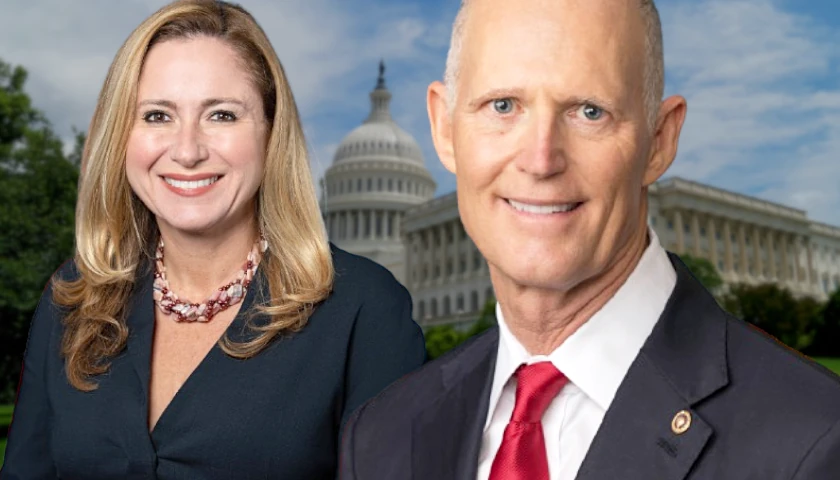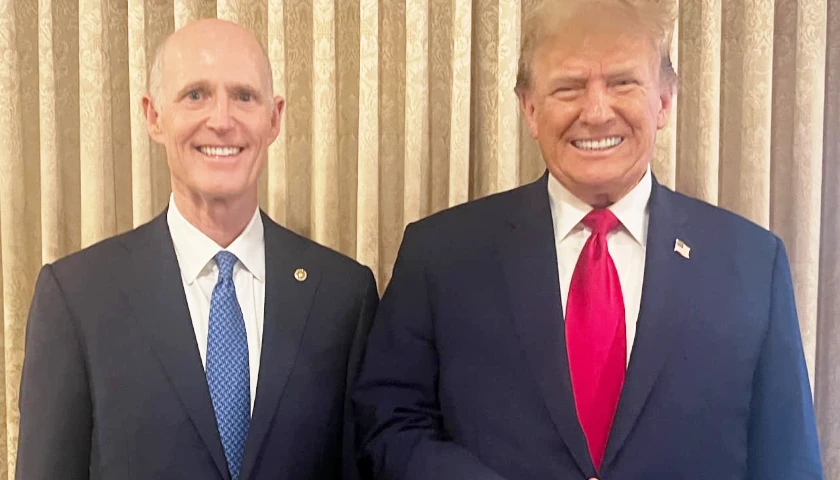Republican incumbent Sen. Rick Scott and Democratic challenger Debbie Mucarsel-Powell aired Spanish-language ads this week while amplifying their attempts to reach the Latino vote.
Scott, who speaks fluent Spanish, has so far released several Spanish language television and radio ads targeting Latino voters, and a pro-Scott super PAC backing Scott is also airing a Spanish language ad in Spanish in Orlando this week.
Scott’s Democratic challenger, Debbie Mucarsel-Powell, also recently started airing Spanish-language radio ads last month and NPR reported last week she launched a campaign on WhatsApp to connect with the state’s Hispanic community.
Spanish language outreach a critical path to connecting with Florida’s 3.3 million eligible Hispanic and Latino voters
The new ads come in the wake of a report released by the UCLA Latino Policy and Politics Institute, which says Spanish language outreach is the critical path to connecting with the 3.3 million eligible Florida Hispanic and Latino voters.
The report used data from the Latino Data Hub, which also drew information from various census reports including past historical U.S. Census surveys.
“The state’s Latino eligible voting population has significantly higher rates of speaking Spanish,” says the report’s “data brief.” “Four in five Latino eligible voters in Florida are Spanish speakers, including 30% of Latinos who only speak Spanish. These high rates are more pronounced in Miami-Dade County, where more than 90% of Latinos speak Spanish.”
The UCLA report also says that less than 10% of Hispanics only speak English while 40% speak only Spanish in Miami-Dade County while 50% of Latino eligible voters in Florida are bilingual.
Those numbers suggest that Spanish language political ads could make a significant difference in this year’s election.
“Latinos are rapidly growing in number and share of Florida’s electorate. Florida’s Latino eligible voter population has almost tripled since 2000, increasing from 1.2 million to 3.3 million in 2022,” the Latino Data Hub reports. “The Latino share of Florida’s eligible voters increased more than 60% from about 11% in 2000 to 21% in 2022. Latino growth has outpaced that of non-Latinos, who only saw a 27% increase in the same period.
Different messages to different Hispanic and Latino groups
One of the keys to actually connecting with various Hispanic and Latino groups may be targeting the right messages to specific groups since certain political priorities may vary per community.
Some of Scott’s Spanish-language ads have called Mucarsel-Powell a “socialist,” which will most likely resonate in South Florida’s which has the largest concentration of Latino exiles and refugees from communist countries such as Cuba, Nicaragua and Venezuela.
One pro-Scott ad airing in Orlando both Spanish and English is being funded by Project Rescue America, a federal super political action committee, and Scott is also promoting his own Spanish-language ad titled, “Socialismo,” about the dangers of socialism.
Meanwhile, Mucarsel-Powell, who is a native Ecuadorian, often speaks about her naturalization as an American as a means of connecting with recent immigrants, which could resonate with other Hispanic and Latino groups.
She recently launched her first Spanish-language television ad “The Important Things.”
Eligible Hispanic and Latino Voters
According to the UCLA report, 33% of Florida Hispanic voters are affiliated with the Democratic Party and 28% of Hispanic voters are affiliated with the Republican Party while 39% remain independent.
An August Televisa Univision online survey of 567 Latino voters reports that 30% of were undecided about who they were voting for, but that 45% would most likely vote for Scott and only 39% would support Mucarsel-Powell while 33% said they undecided.
“The distribution of Latino eligible voters’ descent groups varies across Florida,” the brief says. “While Cubans are the plurality in the state of Florida and the majority in Miami-Dade County, Puerto Ricans are the largest descent group in Hillsborough County and Orange County. Although there are concentrations of Mexicans across Florida and in Hillsborough County, they are not as common in Miami-Dade or Orange. Instead, Miami-Dade County and Orange County have higher concentrations of Colombians.”
In terms of Hispanic voters however, the Latino Data Hub reports that Cubans and Puerto Ricans make up the highest number of voters with 28.6% of voters being Cuban, 26.6% being Puerto Rican, 9.7% being Mexican, 7.8% being Colombian and only 4.8% being Dominican (other Latino groups were in smaller sample sizes).
A recent Morning Consult survey published Monday reports that Scott has a five-point edge, 47%-42, but an Emerson College poll from last week reported the two candidates were only one percent apart with Scott leading 46%-45%.
– – –
Written by staff reporters at ADN America.





